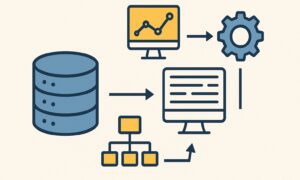Artificial Intelligence has the potential to revolutionize economic growth and development. By leveraging its predictive analytics, automation capabilities, and data-oriented methods, AI can foster innovation across different sectors and help create new opportunities for businesses to grow. In this article, we’ll explore how AI is transforming industries and driving progress in our society.
What is AI and How Does it Impact Our Economy?
AI is a technology that applies natural language processing, object recognition, machine learning algorithms and other forms of data-driven analysis to automate tasks or synthesize large volumes of data. AI can be used in various industries, such as healthcare, retail, finance, energy, supply chain management and more. By leveraging its predictive analytics capabilities, AI can aid decision makers in evaluating risks, predicting trends and creating better forecasting models. As a result, it can significantly improve operational efficiency and productivity across different organizations.
AI-Driven Productivity Increases in Businesses.
The most profound impact of AI technology is on business productivity. When implemented correctly, AI systems can automate tedious tasks and improve performance. For example, machine learning algorithms can be used to identify problems in the customer experience process and provide detailed recommendations for improvement. AI-driven analytics can also help speed up market research by creating predictive models that allow businesses to get insights into consumer behavior, measure customer engagement, or detect fraudulent activities much faster than traditional methods. The automation of processes allows businesses to save time and resources, resulting in increased profitability and economic growth.
Improving Human Skills with Automation.
AI-led automation can also be used to complement human skills and capabilities. With automated processes, companies can free up more time for human experts to focus on more complex tasks, such as problem-solving and decision-making. Automation enables businesses to achieve greater accuracy and precision in tasks that would otherwise be too time-consuming for humans. This can lead to improved efficiency and higher productivity, ultimately driving economic growth and development.
Increasing Innovation with AI-Led Strategies.
AI-driven automation strategies also have the potential to increase innovation throughout different types of businesses. Automation can be used to measure complex trends, as well as identify market and consumer behaviors. By leveraging these insights, companies can develop more personalized products and tailor their services to meet the specific needs of their customers, resulting in greater customer satisfaction. Ultimately, this automated process can lead to higher profits for businesses, thus driving economic growth and development.
The Advantages of Machine Learning and Big Data Analytics for Economic Growth and Development.
Machine learning and big data analytics are two technologies that have revolutionized the way information is analyzed and used. ML algorithms can rapidly analyze large amounts of data to produce accurate predictions, which can be used for forecasting trends and predicting consumer behavior. At the same time, big data analytics provides insights into user behavior, market trends, and consumer preferences that companies can then use to develop better products and services. These techniques are incredibly powerful for driving economic growth and development, as they provide businesses with valuable insights that can lead to higher profitability and customer satisfaction.



































